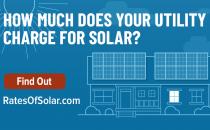SELC, partners strike a deal to keep solar momentum in the Carolinas
A deal struck with Duke Energy in South Carolina will restructure how solar power is billed in a way that benefits rooftop solar customers, solar companies, the utility, and all utility customers.
The agreement aligns interests to provide savings to future rooftop solar customers who agree to help Duke Energy more easily meet energy demands during the times when energy use is highest.
Lauren Bowen, leader of SELC’s Solar Initiative, said the deal is a good compromise among the stakeholders under a deadline imposed by South Carolina’s landmark Energy Freedom Act, passed with SELC’s support last year.
The Act ordered utilities to lift the cap on net metering for rooftop installations and to revise its net metering policies. Net metering allows solar customers to get bill credits for excess energy that is put back onto the grid for others to use.
“This agreement is a step into the future of clean energy for South Carolina,” Bowen said. “It recognizes the importance of the partnerships needed between utilities, solar companies, and homeowners to expand the solar economy while keeping the grid strong, resilient, and affordable.”
Historically, net metering policies across the South have varied widely. Some utilities have offered full credit, meaning they credit a customer the same dollar amount for excess energy as they charge the customer for energy used. Other utilities have offered low credits or charged rooftop solar customers oppressive additional fixed fees. Many utilities have sought to lower net metering credits as more homeowners install rooftop panels while solar advocates and solar companies have pushed for higher amounts to fairly compensate solar customers that are providing valuable electricity to the grid.
The deal called “Solar Choice Net Metering” evolves net metering in South Carolina and eventually North Carolina to get past conflicts over net metering experienced in other states. If the plan is approved by state regulators, future rooftop solar owners under Solar Choice Net Metering would have the opportunity to get financial savings up front if they participate in a solar plus smart thermostat program. This program will eventually expand to include other technologies like battery storage.
Under the proposal, Duke Energy will be able to charge solar customers more during peak demand times when most customers are drawing a lot of power from the grid, similar to surge pricing employed by some toll roads and rideshare companies. By the same token, solar customers will be charged less during off-peak times.
Solar customers will be able to save money during peak times by installing a smart thermostat which Duke Energy can adjust during high demand. Plus, customers whose panels are able to send energy to the grid during peak demand can receive additional credit.
The agreement needs to be approved by the South Carolina Public Service Commission, and associated approvals are also necessary from North Carolina.
SELC represented the South Carolina Coastal Conservation League, Southern Alliance for Clean Energy, and Upstate Forever in the negotiations. They were joined by other clean-energy organizations and solar companies including North Carolina Sustainable Energy Association, Sunrun, and Vote Solar.
The groups and Duke Energy expect to later use this agreement as a blueprint for solar agreements in North Carolina.

